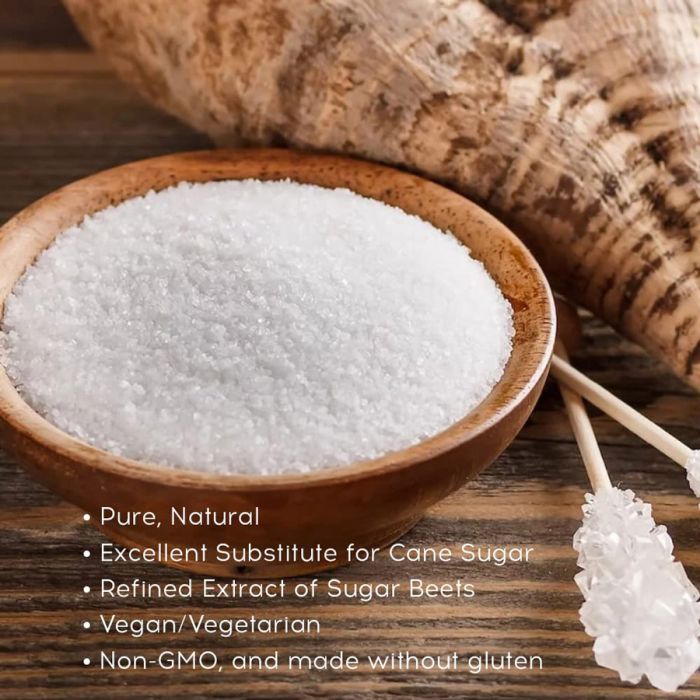The discussion of beet sugar vs cane sugar often includes comparisons of their glycemic index.
A Thorough Take A Look At the Benefits and Uses of Beet Sugar Vs Cane Sugar for Sweetening Options
In the realm of sweetening, both beet sugar and cane sugar deal unique advantages and cooking roles, albeit with similar nutritional profiles. While beet sugar flaunts a neutral flavor perfect for different recipes, cane sugar enriches meals with refined caramel touches. Nonetheless, the ecological considerations of their manufacturing are starkly various, repainting a complicated image of sustainability. This association invites a deeper expedition right into exactly how each sugar effects not only our tastes however also the earth.
Origins and Handling Techniques of Beet Sugar and Cane Sugar
Beet sugar and cane sugar, 2 primary sweeteners, stem from really distinctive plants and go through different handling methods. Beet sugar is drawn out from the sugar beet, an origin veggie, primarily grown in cooler climates.
Alternatively, cane sugar comes from the sugarcane plant, a tropical turf. Its handling begins with gathering the cane, squashing it to get the juice, and after that steaming this fluid to create sugar crystals. The staying molasses-rich fluid can be re-boiled several times to generate differing qualities of sugar. This process, although somewhat comparable in its objective, varies substantially in regards to the ecological problems needed for farming and the initial actions in removing sugar. beet sugar vs cane sugar. Each technique shows adjustments to the corresponding plant's natural habitats and residential or commercial properties.
Nutritional Comparison: Beet Sugar Versus Cane Sugar

When comparing the dietary material of beet sugar and cane sugar, it ends up being evident that both kinds provide a comparable energy worth. Both beet and cane sugar are 99.9% pure sucrose, making them practically similar in terms of calorie web content and nutritional profile.
However, slight differences may occur from the marginal trace components that continue to be after handling, though these are also small to impact overall wellness. As an example, cane sugar can maintain traces of molasses, relying on the degree of refining, which might include tiny amounts of calcium, iron, and potassium. Beet sugar, on the various other hand, generally undertakes a procedure that removes these micronutrient a lot more extensively, causing an also purer type of sucrose.
Culinary Utilizes and Flavor Profiles
Despite their dietary similarities, beet sugar and cane sugar diverge significantly in their culinary applications and taste subtleties. Beet sugar, obtained from sugar beetroots, typically has an extremely neutral taste, making it a preferred selection in cooking where it flawlessly incorporates without changing the taste profile of various other components.
Chefs and home cooks alike select sugars based on these qualities. While both sugars function similarly in terms of sweetness and physical homes, the minor taste difference can affect the end result of a dish significantly, leading the selection between beet and cane sugar based on the preferred end outcome in cooking developments.
Wellness Implications of Consuming Beet and Cane Sugars
Although beet sugar and cane sugar are typically used reciprocally in food Learn More preparation and cooking, their health and wellness implications can vary subtly as a result of their distinctive processing view it techniques. Both sugars give regarding the same quantity of calories and carbs per tsp, essentially supplying similar energy contributions without any kind of intrinsic nutritional benefits. The refining process for each sugar can change the existence of trace minerals and substances, although these variants are generally very little and not considerable enough to impact one's wellness meaningfully.
The main health and wellness concern with both types of sugar concern their contribution to extreme calorie intake, potentially causing weight gain, and connected conditions like type 2 diabetes mellitus and heart disease when eaten in big quantities. Regardless of the resource, small amounts is essential in consuming beet or cane sugars. Health professionals often advise limiting sugarcoated in any kind of form to preserve optimum health and wellness results.
Ecological Effect and Sustainability of Sugar Production

Alternatively, sugar beet processing often tends to generate huge quantities of pulp waste, which can be repurposed as pet feed or exchanged bioenergy, thus minimizing some ecological influences (beet sugar vs cane sugar). Ultimately, the sustainability of sugar manufacturing depends upon taking on more eco-friendly farming strategies and waste administration methods to minimize the environmental impact of both sugar kinds

Verdict
To conclude, both beet and cane sugars use useful sweetening choices, each with distinct advantages and drawbacks. While they are nutritionally similar, their growing effects and taste profiles vary significantly. Beet sugar is notable for its sustainability and neutral preference, whereas cane sugar is prized for its rich flavor. Customers should think about these factors, in addition to the ecological ramifications of sugar production, to make enlightened options about sugar intake that line up with culinary requirements and honest values.